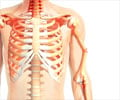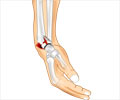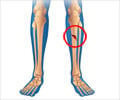Fish is a rich source of omega-3 fatty acids. Fatty acids are known to have a significant role in the vulnerability of having fractures of hip or pelvic bone.
Prof. Rebecca Jackson and her colleagues conducted a study to assess the relationship between omega-3 fatty acids and fractures of hips. Her research was published in the Journal of Bone and Mineral Research.They examined the red blood corpuscles of females with and without past history of fractured hip and found that high levels of omega-3 fatty acids of both plant and animal origin were associated with decreased risk of having fractured pelvis.
While comparing the effect of omega-3 fatty acids with those of omega-6 fatty acids, the experts noticed that the risk of hip fracture increased with the rising ratio of omega-6 fatty acids to omega-3 fatty acids.
The researchers however were unclear about the exact mechanism responsible for this strange association, they figured that inflammation may account for bone resorption, the process of breaking down of bone due to release of osteoclasts.
Prof. Rebecca Jackson, the study's senior author and a professor of endocrinology, diabetes and metabolism at The Ohio State University mentioned, "Inflammation is associated with an increased risk of bone loss and fractures, and omega-3 fatty acids are believed to reduce inflammation. So we asked if we would see fractures decrease in response to omega-3 intake."
She added, "One thing that was critically important was that we didn't use self-report of food intake, because there can be errors with that. We looked directly at the exposure of the bone cell to the fatty acids, which is at the red blood cell level."
Fractured hips are the most frequent osteoporosis-related fractures with reported mortality rates up to 20 to 24 percent in the first year after a hip fracture according to the International Osteoporosis Foundation data.
Prof. Tonya Orchard, the assistant professor of human nutrition at Ohio State and the first author of the study said, "We don't yet know whether omega-3 supplementation would affect results for bone health or other outcomes."
Tonya added, "Though it's premature to make a nutrition recommendation based on this work, I do think this study adds a little more strength to current recommendations to include more omega-3s in the diet in the form of fish, and suggests that plant sources of omega-3 may be just as important for preventing hip fractures in women."
Omega-3 and omega-6 fatty acids are essential fatty acids as well as polyunsaturated fatty acids which implies that they are needed for biological processes but must be consumed because the human body does not produce them on its own.
Omega-6 fatty acids have both anti- and pro-inflammatory effects while; omega-3 fatty acids have anti-inflammatory qualities.
The scientists enrolled volunteers from 1993 to 1998 and tracked them for fifteen years. Their blood samples and hip fracture records were obtained from the Women's Health Initiative (WHI), a large national prospective study of postmenopausal women.
The analysis revealed that high amount of omega-3 fatty acids and two other specific kinds of omega-3s were concerned with lower tendency of hip fractures.
Females having high ratio of omega-6 to omega-3 fatty acids have twice the threat of hip fracture in comparison to females with the lowest ratios.
According to experts eicosapentaenoic acid (EPA) and alpha-linolenic acid (ALA) are the main omega-3 fatty acids associated with reducing the risk of fractured hip.
Alpha-linolenic acid is derived from flaxseed oil and some nuts while eicosapentaenoic acid is found in abundance in fatty fish. Docosahexaenoic acid (DHA) does not have a major role in hip of fractures.
Prof. Tonya Orchard, mentioned, "But all three omega-3s were in the protective direction."
This work was financially aided by the National Center for Advancing Translational Sciences. The WHI was supported by the National Heart, Lung and Blood Institute.
Reference: Journal of Bone and Mineral Research 2013.
Source-Medindia















